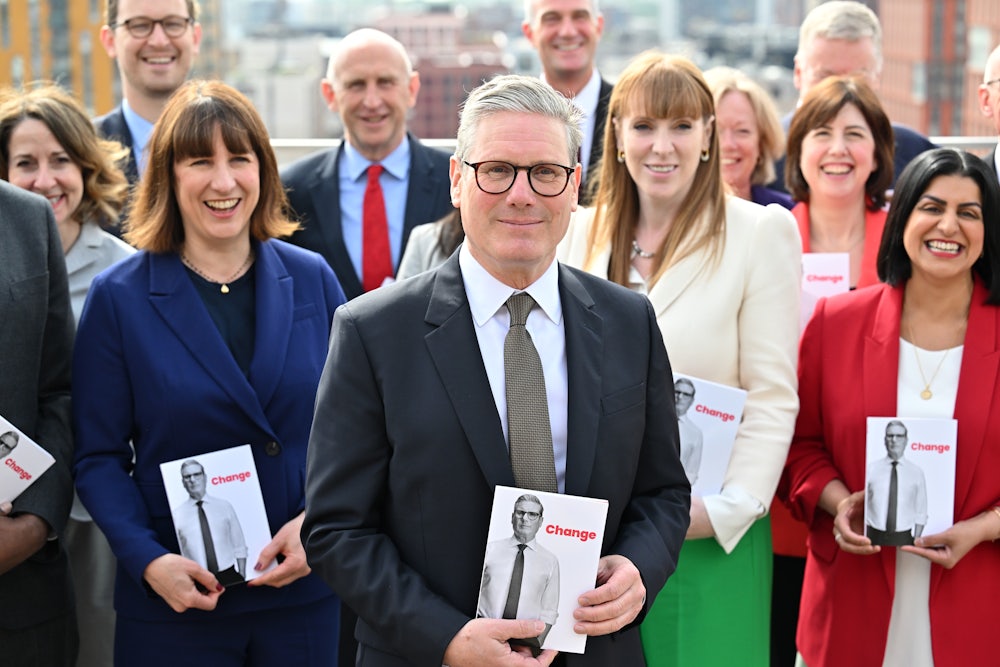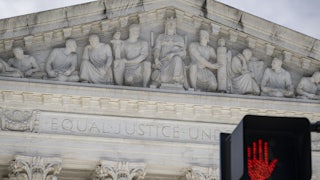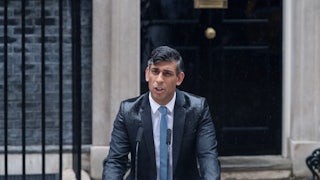This was supposed to be a generational election. A once-in-a-lifetime fight. An overturning on the scale of 1979, 1997, or 1945. The seismograph has been hitting the limiter for a year now, tapping out the coming rumble of a landslide. Wipeouts are forecast; decimations, vanquish, conquest. In power for 14 years, the Conservatives might be bound for third-party relegation. Keir Starmer has been pre-anointed the next prime minister. A decade of power awaits Labour.
But emerging out of these last five weeks in the United Kingdom, we are stuck with a troubling fact: The election campaign did not matter. The vote matters, of course, but the vital pitch and thrust and excitement of a race—particularly one that augurs a transformative political shift—was absent. It was absent because of those polls that fixed the general result long ago. A Labour victory is inevitable—why bother caring how we get there? It was also absent because this year’s slate of candidates is notably flat and boring—and they are flat and boring by design. Technocrats, party hacks, civil servants. Not a drop of charisma to share among them.
You’d think that this lack of charisma might be a virtue, a chance to fight an election on policy alone. No sign of that either. “We’ve not had a broader debate about Britain’s place in the world, how we keep the U.K. together, or the technological revolution that will change so much, including the way government works,” shrugged Pat McFadden, Labour’s campaign chief. Or indeed about stagnant wages, middling growth, collapsing public services, and an emaciated National Health Service. But Labour preferred it that way: this studied silence, this stolid commitment to leaving the boat unrocked. They got what they wanted.
For a long time the British electorate has been the field on which a hundred Tory psychodramas and spasms of egotism have played out (not least of these was Brexit), and it has already decided to shrug off this subservience. But what fuels the shrug? Rage, mostly. Rage at their own immiseration. But it is a rage that points only in one direction, not matched by corresponding enthusiasm the other way. What fuels the Labour vote? A unified swallowing of the sick at having to consent for the least-worse candidate again, followed by a sigh of Fine, go on then.
After a flurry of farce punctuated by scandal, only two mysteries remain before Thursday night. One is how low voter turnout will be. The other is the scale of Tory defeat. Even Prime Minister Rishi Sunak is close to losing his own seat. The party might not survive. In the street and during television debates, Sunak was challenged constantly by the dispossessed and the furious. His stock response to these people will be the party’s epitaph, marked in granite as a reminder of their attitude to anyone they consider beneath them: “I’m sorry you feel that way.”
Often called the “default” or “natural” government of Britain (often by people who’d prefer it that way), the Conservatives showed up to the election Sunak called in May slurring and bumping into the furniture. Their record of sleaze, corruption, entitlement, and sadism drifted the party into a baffled malaise where even their most obvious principles no longer registered. The eightieth anniversary of the Normandy invasion fell two weeks into the campaign. Sunak appeared for the first few days of commemorations in France but, on the final crucial afternoon, fled back over the sea to prerecord an interview for the channel ITV—an interview that would not air for another week and that nobody would want to watch anyway. David Cameron, a predecessor as P.M. now resuscitated as foreign secretary, was left to pose in the leaders’ line-up.
The resulting “scandal” (if it even deserves so worthy a name) was opportunist. The political press, usually callow and deferential to Tory power, found an easy stick for beating. But there are certain rituals and obligations in British public life that, no matter how fogged-over and encrusted with myth, can never be insulted. Our Tommies socking it to the Hun, single-handedly winning the Second World War—no half-capable politician would ever violate that creed. Sunak’s “insult” to their graves as well as to those veterans still alive was the moral equivalent of Joe Biden tottering down to Lower Manhattan and dribbling into the 9/11 Memorial.
Spent of ideas, spent of vision, spent of life, and with nothing of the state left to flog but its memories, the Tories fell back on allusion and gesture—and couldn’t even get that right. The D-Day snub was especially ironic because Sunak evoked the war in his election announcement, spent much of the last leaders’ debate on Wednesday night warning voters not to “surrender” the borders or their taxes to Labour; and his flagship idea was the resurrection of something not seen in these isles since 1963: conscription. “National Service” is what Sunak calls it, and it’ll never happen, but it fires the neurons of the Tories’ elderly base with dreams of discipline. What we really need, they reckon, is a bluff mustached sergeant-major to bellow in the faces of pimply permed youths—these youths with their unreasonable fears of climate change, their petty tantrums about a future of decline. An electoral map of the likely votes of 18- to 24-year-olds shows not one spot of Conservative blue in the entire country.
For 14 years the Tories’ expertise has been in high-level corruption and asset-stripping. These crimes wear ideological clothes and are called things like “austerity,” “Brexit,” and “tax cuts,” but really they are variations on the theme of common theft. Where’s all our money gone? To the rich, encouraged and helped along by the Conservatives. The most affluent 350 people in Britain now possess a combined wealth roughly equal to Poland’s gross domestic product. Common sense says they’d try hard not to let this state-sanctioned picking of pockets look like a caricature of aristocratic jobbery. But here is Michelle Mone and her husband, who received more than 200 million pounds ($253 million) in contracts to produce face masks and surgical gowns during the Covid pandemic. They allegedly used their connections in government to get in a “VIP lane” for state funding, then shipped the millions in profit to offshore accounts. Some of the medical gear was defective and never used. Michelle Mone is a baroness who sits as a Tory peer in the House of Lords.
Rot runs so deep into the structure of the Tory Party and its time in government that its candidates and officials are willing to go to the wall for a few extra quid. In the middle of the campaign, a steady trickle of exposés accused several party functionaries of placing bets on the date of the election before it was publicly revealed—including one of Sunak’s closest parliamentary aides, a handful of candidates, as well as the Tories’ deputy chief whip, its director of campaigning, and its chief data officer. While some other cases investigated by the Gambling Commission include candidates betting on themselves to lose a vote, it smells a lot like insider trading: people high up in the party who had foreknowledge and used it to (allegedly) enrich themselves. What role models they are, in a nation where 1.4 million people are considered problem gamblers. So small-time. So petty. Yet a perfect exemplar of how a culture of grift trickles down and poisons the groundwater, and how something as small as placing a wager can stand in for a decade’s recklessness and robbery.
In five weeks’ of campaigning, the Tories’ polling numbers have moved slightly: downward. On June 3, Nigel Farage entered the race, taking over leadership of the Reform Party and announcing he would compete for the seaside seat of Clacton. Farage has never won a seat in the Commons before, operating outside the chamber by stirring resentment and propping up scapegoats. This is his eighth attempt and best chance yet. Reform’s spiritual forerunner, the UK Independence Party, or UKIP, only ever scraped 12.6 percent of a national vote—even during the zenith of Brexit chaos. This time Reform could hit anywhere between 16 percent and 20 percent, tickling the lower end of the margin of error of the Conservatives’ vote share. If Farage prises away enough grumpy Tories, he could lead the second-largest party behind Labour and become His Majesty’s Most Loyal Opposition.
Like all his other enterprises, Reform is a vehicle for Nigel Farage and the bagmen he carries with him. But if it does have a real constituency, they are defined by two factions. On one side, those who believe Britain really did beat the Nazis alone; as 60-year-old men they have spinning mobiles of Spitfires and Hurricanes above their bed. On the other, those who think we were on the wrong side in the war. Take Ian Gribbin, Reform candidate for the seat of Bexhill and Battle, who suggested Churchill should have accepted Hitler’s offer of neutrality (he also believes women should be “deprived of health care”). A Reform canvasser was caught on camera using a vicious racial slur against Rishi Sunak. Given half a chance, this lot would try and dig up Oswald Mosley’s bones to worship. Still, for 30 years Farage has held the title of the U.K.’s most boisterous patriot and proved he can hold together ridiculous coalitions. It is futile to fight him on the turf of national pride. You can’t out-jingo the People’s Teabag.
At least in their derangement and gruesomeness Reform had enemies to attack and a story to tell. Labour under Keir Starmer has no enemies and no story. Its “messaging” refused to draw from the deep (and real) history of Labour as the builders and guardians of much that is treasured in public life, above all the National Health Service and the welfare program. This country has a long memory; where the Tories mine it for cheap tricks, Labour would prefer we forget different things are possible.
Pressure-washed down to a smooth beige finish, it has been made to look like a skim-milk political party fearful of saying anything that might mean anything. It is a deceitful disguise. Starmer is capable of real ruthlessness, as is his strategy don Morgan McSweeney. They have proved it with their total purging and punishment of anyone to their left. But very little of that agility and aggressiveness has been directed at the Tories. They have kept the bloodied knife well hidden behind their backs. During debates, Starmer is peculiarly limp for a former prosecutor, letting Sunak tell wanton fibs and stuttering instead of striking. Indeed, his criticism of Conservative rule is not on moral or ideological grounds but a complaint about style and procedure: They are too incompetent, too inept, too messy.
Even the front cover of Labour’s manifesto is dishonest. It shows a surly-looking Starmer and a single word: “Change.” Never mind that Barack Obama obliterated the meaning and resonance of that term; what exactly is being “changed” when the party has already accepted defecting Tory members of Parliament into its ranks and drunk deeply at the trough of rich donors? Inside the manifesto there is much talk of “joined-up thinking” and “securonomics,” and plenty about new working groups and commissioners and investigative bodies: lots of “strategies” and “plans.” All nice new paint to slop over the invasive rust corroding the country. But no flash of blue and violet, no glint of silver, no sign of the money, which is the only thing that might yet haul Britain from its torpor. Labour is not a determined fighting organization willing to dismantle the architecture of austerity. It is now, on the verge of government, the caretaker of a cruel and crude system. It has already surrendered.




